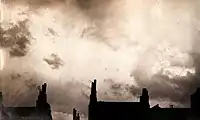Ralph Abercromby (meteorologist)
Hon. Ralph Abercromby (11 February 1842 – 21 June 1897) was a Scottish meteorologist.
Abercromby was born in Leamington, Warwickshire,[1] the youngest son of the third Lord Abercromby. His mother, Hon. Louisa Penuel Forbes, was a daughter of Lord Medwyn.[2]
His obituary in Nature summarises his ancestry, "Several of his immediate relatives had been eminently distinguished. His great-grandfather, Sir Ralph Abercromby, who died in 1801, in the moment of victory, at the Battle of Alexandria, had served his country with brilliant distinction, in the West Indies (Trinidad) and at the Helder."[3] He himself served in the British army from 1860 to 1869 and was stationed in Quebec.[4]

Ralph Abercromby is noted for his contributions to meteorology, his travels producing reports in Seas and skies in many latitudes such as weather and telegraphy at the US signals office. He wrote on the nomenclature of cloud formation, and figured prominently in the history of the classification system developed by Luke Howard;[5] along with Hugo Hildebrand Hildebrandsson (1838-1920) he developed the system laid out by Howard.
He attained the rank of lieutenant in the 60th Rifles. Abercromby died unmarried in 1897 in Sydney, Australia.[2][6]
Works
- 1887 Weather: A Popular Exposition Of The Nature Of Weather Changes From Day To Day (1888), Kessinger Publishing, ISBN 0-548-82646-3
- Cloud Land In Folklore And Science (Folklore History Series), Pierides Press, ISBN 1-4455-2335-3[7]
- Principles Of Forecasting By Means Of Weather Charts, Pierides Press, ISBN 1-146-39376-8
- Seas And Skies In Many Latitudes: Or, Wanderings In Search Of Weather, Nabu Press, ISBN 1-144-14870-7
His essay on the climate of Australia was reissued as "Ralph Abercromby, H. A. B. 1865 Hunt, Henry Chamberlaine Russell, Three Essays On Australian Weather, Nabu Press, ISBN 1-177-54608-6"
References
- 1851 Scotland Census
- Burke, Sir Bernard, ed. (1914). Burke's Peerage, Baronetage & Knighthood (76th ed.). Burke's Peerage & Gentry. p. 55.
- Nature 57, 55-55 (18 November 1897) | doi:10.1038/057055b0
- "Notes". Popular Science Monthly: 720. March 1898. Retrieved 14 May 2013.
- telegraphic codes and message practice, 1870-1945: telegraphy in meteorology citing Richard Hamblyn's The Invention of Clouds : How an amateur meteorologist forged the language of the skies (New York 2001)
- "Notes". Popular Science Monthly: 144. November 1897. Retrieved 7 May 2013.
- Cloud-Land in Folk-Lore and in Science The Folk-Lore Journal. Volume 6, 1888
External links
 Works written by or about Ralph Abercromby at Wikisource
Works written by or about Ralph Abercromby at Wikisource